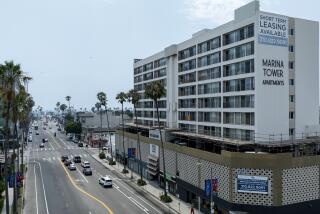L.A. Real Estate Developer Faces SEC Fraud Suit
Despite the disastrous injury it suffered as the result of federal regulatory action against a savings and loan firm in April, 1985, Dover Development Corp. continued to sell real estate investment partnerships until recently, the Securities and Exchange Commission has alleged.
The Los Angeles-area real estate developer, however, neglected to tell its new investors of this adversity and knowingly deceived its customers about other crucial information, the securities fraud suit alleges.
The suit said Dover filed for protection under Chapter 11 of the U.S. Bankruptcy Code on behalf of itself and all of its limited partnerships last Feb. 4 as a direct result of the action against the savings and loan, which was not identified.
The complaint, filed Tuesday in U.S. District Court here, named as defendants three Orange County executives of Dover and a second accused firm, Professional Resources Inc. of Brea. All of the defendants consented to the entry of permanent injunctions against them in the case without admitting or denying any of the suit’s allegations.
The SEC said in its suit that the firms raised at least $4.5 million from at least 200 investors in California and other states since 1981.
Full Accounting Ordered
Under the court order, the defendants are forbidden from violating securities laws in the future. Also, the three individual defendants are ordered to give a full accounting within 120 days of all investor funds and the whereabouts of the remaining money.
The injunctions were filed with the complaint against David L. Bustrum of Brea and Robert Gray Gibson of Newport Beach, Dover’s two top officers, and Telvin A. Hagen of Whittier, president of Professional Resources.
The complaint said that Dover--which, until March, 1982, was called Mountain States Management Services Inc.--has its principal offices on Hollywood Boulevard.
The unidentified S&L; had lent funds to one of Dover’s partnerships, according to the suit. As the result of action against the savings institution by the Federal Savings and Loan Insurance Corp., Dover lost commissions that it had expected on the sales of its units.
Without disclosing the adverse financial effect on Dover and all of its partnerships, the defendants continued to sell interests in other limited partnerships, the suit said.
The complaint said Dover also failed to inform investors in 1984 and 1985 that it was in debt from at least June, 1983, until it filed its bankruptcy petition, on borrowings of more than $517,000 from a firm owned entirely by defendant Bustrum.
More to Read
Inside the business of entertainment
The Wide Shot brings you news, analysis and insights on everything from streaming wars to production — and what it all means for the future.
You may occasionally receive promotional content from the Los Angeles Times.










